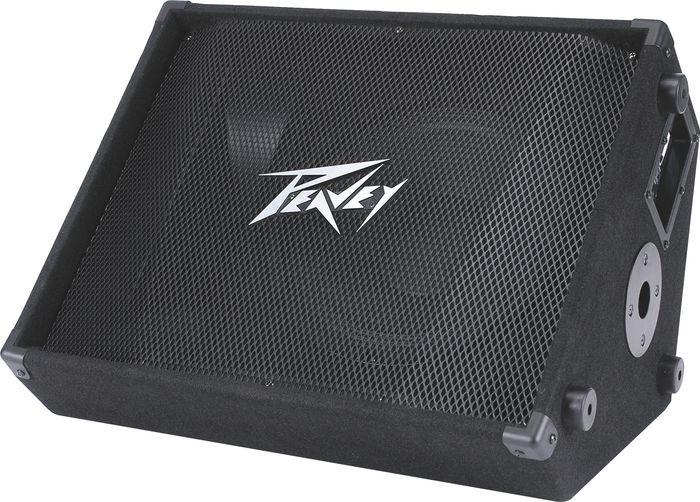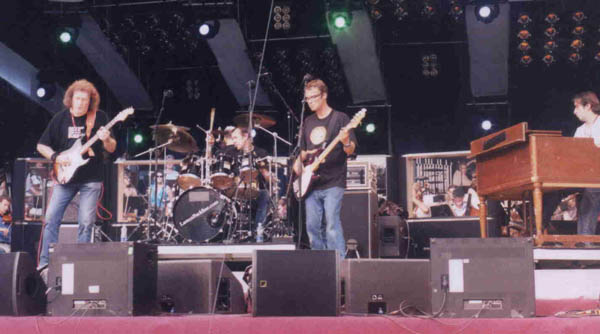In discussions about live amplified performance, I have heard the term "monitor" or "monitor speaker" - what does this mean?
3 Answers
In many live music contexts, musicians have the problem of hearing themselves clearly. Typically when playing loud, musicians are positioned behind the main speakers (heard by the audience) to avoid feedback, and for the safety of their own ears.
In that basic scenario, musicians only hear:
- the quiet sound coming from their acoustic instruments or voices
- the sound coming from their on-stage instrument amplifiers
- the muffled sound leaking from the back of the main speakers
- sound reverberating from surfaces in the room (e.g. the wall facing the band)
This is far from ideal for the band members. On-stage, the guitar and drums might drown everything else out - but even they have to contend with delayed echoes from the back wall (in a large room) which throw their timing out. Acoustic instrumentalists and singers can't hear themselves at all.
One solution to this is to have speakers on stage, facing the band members. These speakers are quieter than the main speakers, but loud enough to let the band hear a clear version of what they need to hear.
This is called monitoring, and the speakers used are called monitor speakers or just monitors.
One very simple case for a small electric guitar band in a small venue, is for guitarists to simply monitor from their own amps, and for the vocalist to have a monitor through which they hear only vocals.
From there, the sky's the limit for complexity. A bigger band will have a separate mix to be heard on stage - often with fewer effects applied, so musicians can hear exactly what they're doing. The most sophisticated setups may have a separate mix for each musician, so each one can hear a mix tailored for their particular needs.
Any speaker placed for the purpose of the musician hearing their own performance is a monitor. However some speakers are specially designed for the purpose of stage monitoring. For example, many are made in a wedge shape, designed to be positioned at the musician's feet, projecting sound up at them.
Although usually quieter than main speakers, there is still a danger of feedback from monitors, and so care has to be taken in positioning them, and in positioning microphones. An advantage of the wedge position is that a vocal microphone is typically pointed directly away from the monitor speaker. Purpose-made monitors often have built-in EQ facilities, which can be used to prevent feedback.
One alternative, or adjunct, to monitor speakers, is in-ear monitoring, in which the performer hears through an earpiece.
Next time you're at a concert, it's worth looking at the stage layout, to see how things have been set up so the performers can hear the right things. Bear in mind that for big venue rock concerts nowadays a lot of the "sound equipment" on stage is a prop. That wedge the rock singer is stepping onto might be a monitor -- or it might be an empty box for theatrical effect. That huge guitar amp might be producing sound -- or it might not be plugged in, with the real sound coming from a less visually impressive amp off-stage.
Note that the term "monitor" is also used in the studio. It has much the same meaning -- providing what the performers and producers need to hear -- but the motivation and implementation is slightly different.
-
5usually quieter, yes. I used to play with a band that had more sound pressure on stage than in the auditorium. Why ? Never got a proper answer. Everything had to be D.Id, and the back line amps were up to too great a volume anyway.They said it was to be able to hear what we were doing. Turning down would have been a far better solution, but never got tried. Ideally, each member would have his own mix, not dictated by a sound engineer - some of whom were very far from sound !– TimCommented Jul 3, 2014 at 9:47
-
2@Tim I suppose there are some reasons to be very loud on stage -- some guitar amps only produce the desired tone at high volume (ZZ Top put an amp in a soundproof box, with a mic). If you're trying to produce guitar feedback, you need loudness.– slimCommented Jul 3, 2014 at 11:45
-
one thing to note that isn't mentioned is that sometimes the "front of house" mixer will also feed the monitors while other times there will be a second mixer (closer and off to the side of the stage) that will provide the mix to the monitors. if you are lucky you will have a good second sound person mixing the monitors so you can hear what you need to hear.– b3koCommented Aug 20, 2018 at 20:46
-
Note that in some cases (e.g. keyboards, and bass/guitar if using DI without an amp) monitoring may be the only way to hear what you're playing! (In one performance, I lost monitoring entirely for one song — and had to play what had become a ‘dummy’ keyboard, entirely from memory of what keys were needed when. An interesting challenge, but not one I'd recommend…)– giddsCommented Apr 20 at 22:23
As a sound technician for my church, one of the most important roles is making sure the musicians can hear themselves. This is done by controlling the levels in the monitors. Often, these sit on the stage and are called "Floor Monitors". These sit between the musicians and the crowed, and are pointed back at the performer.


-
The stage photo raises some question of it's own. The box in the very center and it's partially visible sibling one the left seem to be some "fill-in" speakers for the first row. Then there are two rectangular boxes that are possibly each an amp of sort for each of the guitar players. Then, finally, between all that, are two actual, wedge-shaped monitor boxes. Wow, I don't want to be the sound engineer of that band.– MarcelCommented Sep 24 at 18:47
Another term for monitoring is 'foldback', which sums it up quite nicely. The sound is re-routed via speakers- on stage or in ear,in order to be useful to each muso. Care needs to be taken that the mix given to each individual is not tainted by any other sound source.Drums and bass, for example, need to hear each other far more than , say keys, so the drummer would need a lot more bass in his foldback than keys.
